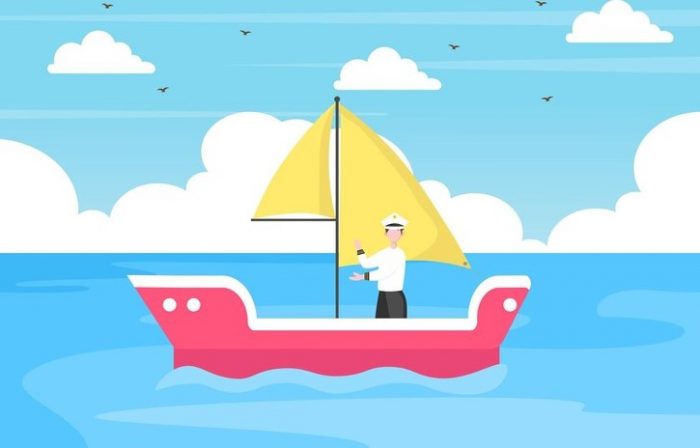The phrase floats for your boat means doing what brings you joy or makes you happy. It is used in different situations, maybe as a sign of joy or happiness but as a sign of personal choice or decision. Here’s an example of how the phrase can be used in Sentences:
- “It is your graduation. We can head out to the beach or go shopping in the mall. Whatever floats your boat.”
- “Well, it is your womb escape day! We can go swimming or have a hike. A picnic can also do. It is you to decide whatever floats your boat.”
The above sentences clearly describe the phrase and its use on some occasions and contexts.
The origin of the phrase

Unfortunately, the phrase’s origin, ‘Whatever floats your boat, is not well identified. Many years back, with all the language, phrases, sayings, and even saying inventions, the recording of exactly where, the person who said it, and in which year or era, it was said was not a pretty huge deal. The people did not even know the value of creating the language used to date and will be used for a thousand more centuries to come.
Although the source is unclear, in 1826, a phrase similar to this was used by John Howard in a particular play. The phrase “Whatever gives you pleasure” is wordy and different but carries almost the same meaning as the subject phrase.
Another source also has a blind claim that the phrase was from the Reaganomics, well-respected sea travelers who played a big part in language creation in the 80s. However, the origin of this saying remains a mystery even to language philosophers and historians.
The spread and usage

After the birth of this phrase to the world in the early 1800s, it was not until the 1980’s that it was frequently used. This leaves a gap of almost a century. Why did this phrase disappear? The phrase had not disappeared. Back then, the world was not technological as it is now. This phrase was only used as word of mouth and not put into writing, making the spreading even slower.
Language spreads, and then people only use what they had been taught in schools, read in books, or just learned from their fellows, unlike now, where the world revolves around slang and trends all over the globe. The continents have been made into one, thanks to technology. The world is just a global village.
Our subject phrase is claimed to have been brought to the spotlight later in 2004 through the Urban Dictionary.
Is ‘whatever floats your boat a rude phrase?
This phrase, as earlier stated, is a matter of one’s personal choice or opinion. However, it can be somehow rude when used in the wrong context. Nevertheless, context is crucial thing here. The phrase can sound rude and, at the same time, not sound rude at all. One says it to assure the other party that an individual’s commitment and acknowledgment are required. It is a free world. Everyone has their own right in whatever they do.
The apparent opposite
The opposite phrase whatever floats your boat is the opposite; it does not float your boat. Something that does not float your boat is that you do not enjoy or do not want to do or does not please you.
It is mainly based on an individual’s point of view, and most of the time, it is the person who says it. This is attributed to one’s knowledge of knowing what pleases and what does not please them. It is neither judgmental nor rude most of the time and is considered one’s way of explaining and expressing themselves what they do not like or enjoy.
It can be viewed as a polite way of saying No. Nonetheless, the context in which it is used is also crucial.
Similar Phrases
Just like many other sayings, our subject saying also has gained some synonyms over the years, this includes;
- Whatever rides your donkey
- Whatever blows your skirt
- Whatever trips your trigger
- Whatever lifts your luggage
- Whatever humps your camel
- Whatever sizzles your bacon
- Whatever tickles your fancy
- Whatever revs your engine
The synonyms mentioned above are just a few synonyms recorded as up close with matters of similarity. They are also termed to have the same practical meaning as the primary phrase.
What is the difference between sayings, idioms, and phrases?
Sayings, phrases, and idioms all deal with expressions. Despite having different characteristics, they are bound together by their primary objective of trying to express themselves. Despite being drawn by the same purpose, their meanings remain different. Sayings are described as short expressions offering either some advice or wisdom. They can also be called Proverbs.
Idioms are primarily characterized by expression in either music or art. Idioms are also natural to specific groups of people. It is true to say that some communities or even groups of people have specific idioms that are only known in their circle.
Phrases are a group of words that, when standing together, form a clause, which then brings meaning. The uniqueness is that phrases are collections. Individual words come together to form expressions. Not only are phrases simple to form, but they are also easily understandable. They do not entail a hidden meaning such as the sayings.
The phrases are absolute, appositive, gerund, infinitive, noun, participial and propositional.
When it comes to sayings, their types are pretty complex and many. Having eleven types of sayings makes it worse; however, you are not likely to misuse any saying with all the types being understood.
The types of sayings include;
- The aphorism sayings– these sayings are just general. They neither give a specific stand nor specialize in any criteria
- The cliché` or bromide sayings– These sayings are mostly overused and are not original. Their use is also every day among many people.
- The epitaph– These sayings are meant to honor the fallen. These can mainly be the dead or even hazardous causes of death, such as plaque.
- The epithet– These sayings are the popular ones. They describe people- and even things that are already widely known. They can be attributed to giving tribute to people, items, and even places.
- The epigram – These sayings are poetic and written for people, items, and places.
- Idiom sayings– These sayings are descriptive and use real-life situational items. However, they entail a more profound meaning; one cannot comprehend them just by hearing and following the shallow meaning. One has to understand what the inner meaning tries to say deeply.
- Mantra sayings– They are spiritual-based sayings. They tend to be religious and have been repeated for an extended time.
- The maxim or gnome sayings– These are instructional sayings. They guide on the norms. What is right and what is not? They, therefore, do not have an inner meaning.
- The motto sayings– These sayings are personalized. They are used to state an individual’s intentions, ways, and what they want.
- The quip sayings– These are observation-based sayings. They are formed from what an individual sees, observes, or feels and feels fit to set as a saying.
- The witticism sayings are known for being funny and familiar among many people, making them loved and famous.
There are three main classifications of idioms, Phrasal verbs, prepositional phrases, and partial idioms. All of them are different in what explanations they give across. The most commonly used idioms include;
- Stabbed in the back
- Killing two birds with one stone
- It costs an arm and a leg
- Better late than never
- Beating around the bush
- Biting the bullet
Final word
Figures of speech such as sayings, idioms, and phrases are vital elements in any language. Proper understanding and interpretation of these elements make using them simpler and ease communication with people. Our subject, ‘whatever floats your boat, can be mistaken as something relating to water, which is not the case. Therefore, it is essential to consider having to get the actual meaning.
References:
- https://en.wiktionary.org/wiki/whatever_floats_your_boat
- https://www.ldoceonline.com/dictionary/whatever-floats-your-boat
- https://www.urbandictionary.com/define.php?term=whatever%20floats%20your%20boat

Rockey is a kayaking enthusiast who has been kayaking with a local group for the last five years. He loves using kayaks while out on outings on the water or camping when the friends want to have a BBQ party somewhere on the bank of a local lake. More About James R Rockey at About Page Here: Authors
Based on his experiences with the different types of kayaks, he is sharing his opinion about kayaking tricks and required gears so that a beginner can get started right away.
Find his team on Twitter here. Happy reading!
